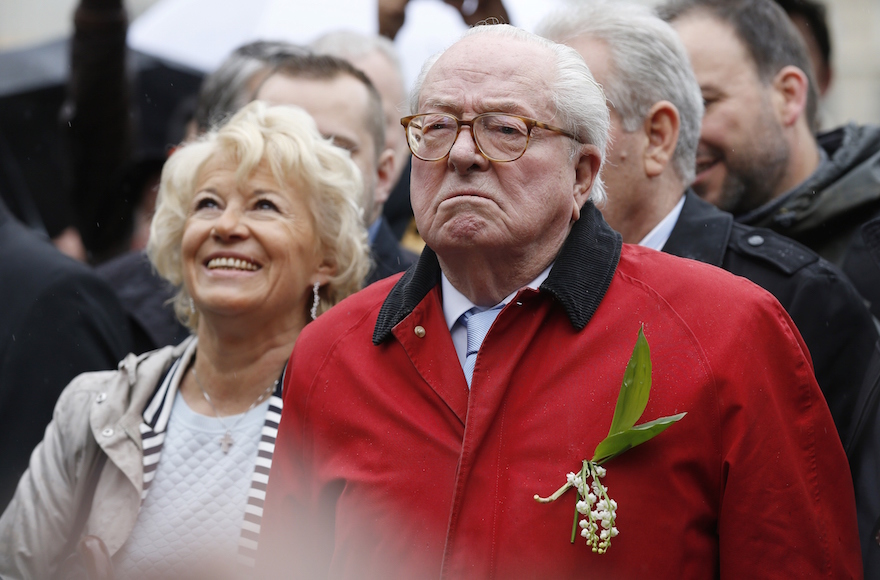Jean-Marie Le Pen, French far-right leader who was convicted of Holocaust denial, dies at 96
Through five unsuccessful runs for president, Le Pen espoused racist and antisemitic rhetoric that landed him in legal trouble in France

French far-right party Front National founder and honorary president Jean-Marie Le Pen looks on at the foot of a statue of Joan of Arc during the party’s annual rally in honour of Joan of Arc in Paris, May 1, 2015. (Thomas Samson/AFP/Getty Images)
(JTA) — Jean-Marie Le Pen, the far-right French leader who espoused racist and antisemitic rhetoric and was convicted of Holocaust denial, has died at 96.
His death was announced on social media by Jordan Bardella, a leader of the party Le Pen founded. “Enlisted in the uniform of the French army in Indochina and Algeria, tribune of the people in the National Assembly and the European Parliament, he always served France, defended its identity and its sovereignty,” Bardella wrote.
Le Pen was born in 1928 in Brittany, France, and entered politics following activism as a student. In 1972, he founded the National Front party, a coalition of extremist groups that steadily accumulated support with its anti-immigrant agenda. Another co-founder had served in the Nazi Waffen-SS.
Le Pen ran unsuccessfully for president five times. In 2002, his penultimate campaign, he came in second to Jacques Chirac, advancing to a runoff but received less than one-fifth of the vote as the French mainstream united behind Chirac.
Through it all, Le Pen espoused racist and antisemitic rhetoric that landed him in legal trouble in France, where Holocaust denial is illegal. In 1987, he was convicted of denying the Holocaust after saying — and refusing to disavow saying — that the Nazi gas chambers were “just a detail” in history.
It was his first conviction but not his last, which came after he was charged in 2017 with inciting hatred over having said about a Jewish singer who criticized the National Front party, “Next time we willl put him in the oven.”
His daughter, Marine Le Pen, was elected the party’s leader in 2011, directly succeeding her father. She sought to moderate the image of the party, renamed National Rally, and denounced her father’s antisemitism.
Jean-Marie Le Pen was ejected from the party he founded in 2015 following the oven comments, sparking a divide among its supporters between those who favored his extremist rhetoric and those who preferred a more temperate approach.
Though he left the party, he did not exit the national stage, continuing to amass fines over his comments and ignite new controversies In 2018, he praised France’s World War II collaborationist government in a memoir. The Vichy government worked with the Nazis to round up Jews and send them to be murdered — the fate of more than 75,000 Jews living in France at the start of the war.
Under Marine Le Pen, who also ignited controversy by saying the French people should not be blamed for their part in the Holocaust, the party has continued to rise in influence. Last year, carried by a tide of anti-immigrant sentiment across Europe, it received a third of the vote in the first round of national elections. The younger Le Pen has focused on opposing immigration and the European Union, and has herself been charged with hate speech against Muslims.













